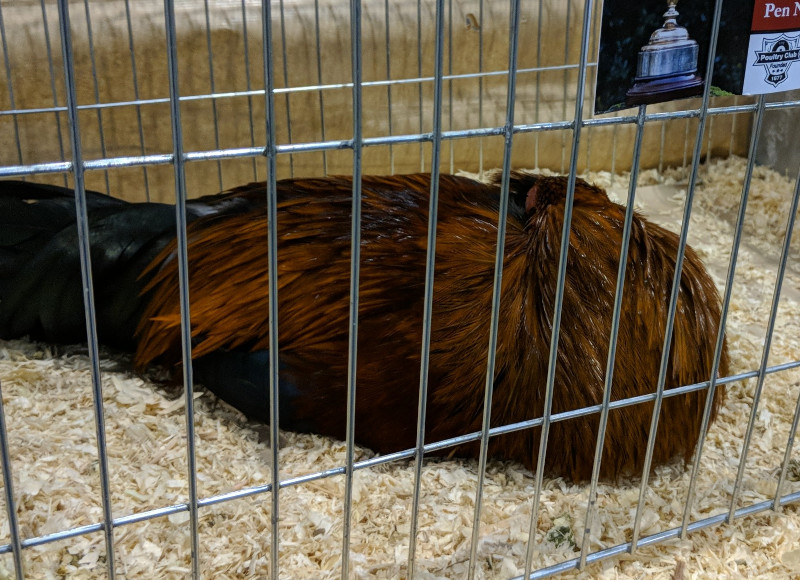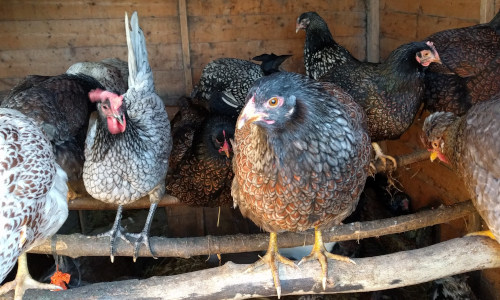19 causes of stress in chickens and how to reduce it in your flock.

This cockerel above is so stress free he has fallen asleep in a busy poultry show.
Table of Contents
The effect of stress conditions in poultry can be huge and even cause death in chickens.
These days there are legal requirements regarding the well-being of animals in your care. Stressed chickens are more likely to be ill and productivity will suffer and could land you in trouble with the authorities.
Below: This is what an unstressed chicken looks like.
There is a measurable increase in the quality of eggs and meat from chickens raised in stress free environment.
How do you know if chickens are stressed?
Chickens that are stressed will behave in a fearful manner and appear frustrated. Aggressive behaviour, pacing up and down in front of fences, hiding in corners or panicking are all signs of stress.
Dominant birds, if hungry and frustrated, become highly abusive of subordinates they would otherwise tolerate.
Below: This cockerel is showing signs of stress by pacing back and forth.
Some breeds of chickens are more easily stressed than others.
Signs of stressed chickens include:
- Behavioural changes and fighting,
- High mortality within the flock,
- Poor feed conversation on a higher high feed intake,
- Lower egg production with a high proportion of thin shelled or defective eggs.
- Chickens stop laying eggs or begin to lay erratically in different locations when stressed.
- Low or slow weight gain,
- Night eggs, floor eggs or outside laying.
- Cannibalism and feather pecking,
- Feather loss,
- Pest, parasites and disease more prevalent.
- A study, published in 2010 found that pale eggs was a sign of stress in layer flocks.
Flock stress can be ongoing, handling a chicken that doesn't like being handled will stress the bird considerably and every time you go near it in future.
Below: These bleating chicks are beginning to show signs of stress.
In a study in 1994 GREGORIO ROSALES found that a whole range of undesirable physiological and psychological stress factors in the flock could be measured.
- Increased levels of corticosterone, insulin, or glucagon.
- Increased metabolic rate and resting energy expenditure.;
- Increased reliance on glucose as an energy source.
- Elevation of plasma free fatty acids.
- Hypoglycemia (increased glucose utilisation).
- Decreased growth and increased muscle degradation.
- Release of acute-phase cytokines.
- Impaired growth of cartilage and bone.
- Redistribution of trace minerals.
- Synthesis of specific stress proteins.
- Decreased voluntary feed intake (anorexia).
- Increased body temperature.
- Immunosuppression.
While measuring the physiological stress factors is beyond the capabilities of most backyard keepers you can still see that all of the effects of stress are both noticeable and unwanted.
You can tell if chicken is stressed by the way it behaves.
What causes poultry stress?
There are many types of stress in flocks of chickens and all can be managed to some extent.
The 19 main causes of stress in chickens are:
- Not being allowed to indulge in natural behaviours. The natural behaviours of chickens include nesting, stretching, wing flapping, dust bathing, preening, ground scratching, foraging, and walking and chickens that are not allowed to indulge suffer considerably. Chickens spend roughly one third of their time scratching and it is critical for their well-being.
- Heat stress, being too hot or cold and unable to find shelter. Heat-stressed poultry flocks reduce feed intake to minimise the amount of heat generated from digestion and energy metabolism. They may consume 10-20% less feed during summer months compared to fall and winter.
- Food and water stress. Not being able to eat and drink enough. This could be both a shortage of feed or a shortage of feeding space.
- Damp, wet and dirty living conditions. Muddy ground, wet litter in the chicken coop and cramped living conditions all contribute to stress in the flock.
- Predators. Having foxes and other predators prowling around the coop at night will rob you hens of peaceful sleep.
- Fighting and bullying stress. Fighting can lead to injuries and general disruption in the flock.
- Overcrowding. Normally docile chickens become quite frustrated when confined in too small an environment
- Travel stress. Getting stuffed in a plastic crate with 9 other chickens is stressful for chickens.
- Moving to a new coop. Chickens are very attached to their home and even cleaning day can be a disruption. Taking chickens that have been free ranged and then confining them to a run will cause stress.
- Parasites like red mites. I once saw a chicken so infested with mites it just stood and scratched. this is not good for harmonious relationships in the coop.
- Breeding. There are hormonal effects related to maturity that can stimulate aggression. Cockerels are rough with the hens and frequently mated hens can be short of feathers.
- Broody hens. A broody hen can cause chaos in the flock as they often fight over a nest. A hen with chicks can be extraordinarily defensive.
- Sickness and disease. These can cause lingering problems in flocks of chickens with all sort of persistent symptoms.
- Unbalanced flock dynamics. Dominant-subordinate relationships usually do not become established until 6 to 8 weeks of age in cockerels and 8 to 10 weeks in pullets. Faster maturing birds are higher up the pecking order.
- Harsh keepers and care-takers. Poor animal husbandry such as neglect or poor handling practices cause stress in the flock and the chickens begin to associate all people with stress.
- Medications and vaccines. There is handling involved in both vaccination and the administration of medications as well as the effect they have on the body.
- Toxins and poisons. These come from surprising places. Old paint, mould toxins in old feed, rat poisons, contaminated ground water and plants are just some. They might not kill the chicken but introduce a lingering malaise.
- Poultry shows. You have to think how you would feel being stuffed in a small cage in front of hundreds of people and then being handled by a succession of judges. Not to mention the travel to and from the show.
- Moulting. Moulting is not a pleasant procedure, the chicken gets cold as the feathers fall out and when they grow back this places a metabolic strain on the chicken coupled with the itchiness of emerging pin feathers.
What can you give chickens for stress?
The best thing you can give a chicken for stress is open space with enrichment like dust baths, hanging foods, swings and perches.
There is no magic potions or foods you can give to chickens to reduce flock stress, it takes a wholesome approach and good husbandry.
Below: Space is essential for a happy flock.

How do I make my chickens less stressed?
Keep the right number of cockerel to hens. Too many roosters will literally shag the feathers off the hens as well as fight.
Below: This was at the top of a post on Facebook and i f this is you then it is likely your flock is stressed.

Chickens are happier under trees as it shields them from aerial predators.
Provide roosts both indoors and out and if you have more than a few hens give two sources of food and water and consider having 2 pop holes.
Space is important in chicken keeping, chickens can be injured if the roosts in the coop are too close to the walls because the coop is too small.
Anticipate and plan for seasonal changes and be ready for moulting and the onset of winter.
Make sure your chickens are eating a balanced and fresh feed and have access to two sources of clean water.
Why is it important to study the management of stress in a flock?
Evidence demonstrates that stress is an important cause of reduced flock performance and increased susceptibility to disease.
The economic and social trends of today’s industry require quality products at the lowest possible cost without any harmful health or environmental effects.
